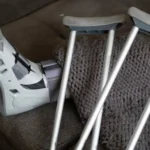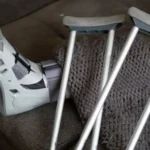Car accidents are traumatic events that can result in a variety of injuries, ranging from minor cuts and bruises to severe and life-altering conditions. If you have a pre-existing injury or condition at the time of a car accident, you might be wondering how this might impact your settlement. In this blog post, we’ll delve into the ways a prior injury can influence a car accident settlement and how to navigate these complexities to ensure you receive the compensation you deserve.
Understanding Pre-Existing Injuries and Car Accidents
When assessing damages in a car accident, insurance companies and courts consider the extent of injuries caused by the accident. However, if you had a pre-existing condition, they might argue that your injuries were not entirely caused by the accident. This can lead to reduced compensation or even outright denial of your claim.
Pre-existing injuries include any medical condition you had before the accident, such as:
Chronic back pain
Previous surgeries
Arthritis
Degenerative disc disease
Previous fractures
The key question is whether the car accident aggravated or worsened your pre-existing condition.
The “Eggshell Plaintiff” Doctrine
In Texas and many other jurisdictions, there’s a legal principle known as the “eggshell plaintiff” doctrine. This doctrine states that a defendant must take the plaintiff as they find them. In other words, even if you had a pre-existing condition, the defendant is responsible for any additional harm caused by their negligence, regardless of your fragility or predisposition to injury.
This doctrine means that even if you had a pre-existing injury, you can still pursue compensation if the car accident aggravated or exacerbated that injury. However, proving this can be complex.
Proving Aggravation of a Pre-Existing Injury
To establish that a car accident worsened your pre-existing condition, you must provide compelling evidence that clearly demonstrates the cause-and-effect relationship between the accident and the aggravation of your injury. This evidence should show a clear progression of your health status before and after the accident, highlighting any new symptoms or the worsening of existing ones. Let’s explore some critical sources of evidence and how they can be used to prove your case.
1. Medical Records
Medical records are a cornerstone of proving the aggravation of a pre-existing condition. They offer an official and comprehensive history of your medical treatment, diagnoses, and prognosis. To establish a connection between your pre-existing injury and the car accident, you should collect:
Records from Before the Accident: These records demonstrate the state of your health prior to the accident, including any treatments, medications, and doctor’s notes that describe your condition. This baseline is essential to show any changes after the accident.
Records from After the Accident: These will detail the injuries sustained during the car accident, any new diagnoses, and the treatment plans recommended by your healthcare providers. This information should indicate how the accident caused additional harm or aggravated your existing condition.
Follow-Up Treatment Records: Continued treatment after the accident helps establish the long-term impact of the incident on your health. Consistent appointments and detailed records from medical professionals will demonstrate the sustained effects of the accident on your pre-existing injury.
2. Expert Testimony
In addition to medical records, expert testimony plays a crucial role in proving the aggravation of a pre-existing injury. This testimony can come from various professionals, such as:
Medical Experts: A qualified medical expert, such as a doctor or specialist, can explain the specific nature of your pre-existing condition and how it was affected by the car accident. They can clarify complex medical concepts for the court and provide their professional opinion on whether the accident aggravated or exacerbated your condition.
Accident Reconstruction Specialists: In some cases, these experts can help demonstrate the mechanics of the accident, showing how the forces involved could lead to injury. This type of testimony can support the claim that the accident was severe enough to cause additional harm.
3. Consistency in Medical Treatment
Consistency in medical treatment is a strong indicator of a legitimate claim. If you have a pre-existing condition, demonstrating that you received regular treatment for it before the accident can be helpful. After the accident, consistent follow-up with healthcare providers reinforces the idea that your condition worsened as a direct result of the accident. Here’s how you can demonstrate this consistency:
Regular Appointments: Attend all scheduled appointments with your doctors, therapists, or other healthcare providers. This shows that you are actively seeking treatment and following medical advice.
Adherence to Treatment Plans: Compliance with prescribed medications, physical therapy, or other treatment regimens further demonstrates your commitment to recovering from the accident-related injuries.
Progress Reports from Medical Professionals: These reports can track your condition over time, providing evidence of any changes or deterioration following the accident.
4. Detailed Documentation
Documenting your experiences and symptoms in detail is an effective way to prove how the car accident has impacted your pre-existing condition. This documentation can include:
Symptom Journals: Keep a daily or weekly record of your symptoms, noting their intensity, duration, and frequency. Describe any limitations or challenges you face in daily activities as a result of your condition.
Pain Scales: Use pain scales to quantify your pain levels, which can help convey the severity of your condition to insurance companies or the court.
Impact on Quality of Life: Document how the accident has affected your ability to work, engage in hobbies, or participate in social activities. This can help illustrate the broader impact of the accident on your life.
By gathering and presenting this comprehensive evidence, you can strengthen your claim and demonstrate that the car accident worsened your pre-existing condition. This approach not only supports your case for fair compensation but also helps counter any arguments by insurance companies attempting to downplay or dismiss your injuries.
Common Tactics by Insurance Companies
Insurance companies often deploy a range of strategies to minimize payouts, particularly when there’s a pre-existing injury involved. By understanding these tactics, you can better prepare to counter them and protect your claim. Here are some common strategies insurance companies use and a detailed look at how they might try to reduce their liability:
1. Denying Causation
Insurance companies might claim that your current condition is entirely due to your pre-existing injury and not related to the car accident. This tactic can be particularly problematic because it shifts the burden of proof onto you to demonstrate that the accident aggravated or worsened your pre-existing condition.
How It Manifests: Insurance adjusters might ask leading questions, suggesting that your symptoms were present before the accident. They could also point to gaps in your medical treatment history to argue that the accident didn’t significantly impact your health.
Why It’s Effective: If successful, this tactic can significantly reduce the compensation you receive, as it discredits the link between the accident and your current condition.
2. Questioning the Severity of the Accident
Another common approach is questioning whether the accident was severe enough to cause the injuries you’re claiming. This tactic aims to create doubt about the connection between the accident and your current health issues.
How It Manifests: Insurance adjusters might downplay the extent of the accident, suggesting that the collision was minor and couldn’t have caused significant injuries. They might bring in accident reconstruction experts to support this claim.
Why It’s Effective: By casting doubt on the severity of the accident, insurance companies can weaken your case, leading to reduced compensation or denial of the claim.
3. Discrediting Your Medical History
Insurance companies might attempt to discredit your medical history by suggesting that your pre-existing condition was more severe than you claim, thereby reducing their liability.
How It Manifests: Adjusters may delve into your medical records to find any evidence of previous injuries or chronic conditions. They could use this information to argue that your current symptoms were pre-existing and not caused by the accident.
Why It’s Effective: If they can demonstrate that you had significant health issues prior to the accident, insurance companies can argue that the accident had little to no impact on your condition.
4. Delaying Claims Processing
Insurance companies might delay the claims process to create frustration and pressure you into accepting a lower settlement.
How It Manifests: Adjusters might request additional documentation repeatedly or delay scheduling meetings and evaluations. They could also be slow to respond to inquiries and correspondence.
Why It’s Effective: Delays can lead to financial strain, especially if you’re unable to work due to your injuries. This can pressure you into accepting a smaller settlement just to resolve the matter quickly.
How to Counter Insurance Company Tactics
Dealing with insurance companies can be challenging, especially when you’re recovering from an accident. It’s crucial to be proactive and strategic in your approach. Here are some effective steps to counter these common tactics:
1. Consult a Personal Injury Lawyer
An experienced personal injury lawyer can help you navigate the complexities of your case, gather evidence, and negotiate with insurance companies on your behalf. They have the expertise to understand the tactics used by insurance companies and can provide guidance on the best course of action.
Why It’s Important: A lawyer can protect your rights, ensure you don’t make statements that could harm your case, and negotiate for a fair settlement.
2. Avoid Signing Documents Without Legal Advice
Insurance companies may try to get you to sign documents that could undermine your claim. Always consult with your lawyer before signing anything, especially if it involves medical releases or settlement agreements.
Why It’s Important: Signing certain documents could give the insurance company access to personal information or limit your ability to seek further compensation.
3. Follow Medical Advice
Consistent medical treatment and following your doctor’s recommendations can strengthen your claim and demonstrate the impact of the accident on your condition.
Why It’s Important: Regular medical treatment creates a clear record of your condition and provides evidence to counter claims that your injuries aren’t related to the accident.
4. Be Transparent
Disclosing your pre-existing condition to your lawyer and medical providers is crucial. Honesty will help build a strong case and avoid surprises during negotiations or trial.
Why It’s Important: If you hide or withhold information, it could come back to harm your case later. Being upfront allows your legal team to prepare an effective strategy and strengthens your credibility.
By understanding and proactively addressing these common tactics, you can improve your chances of receiving fair compensation for your car accident claim. Remember, the key is to stay informed, seek professional advice, and maintain a clear and honest record of your medical condition and its progression after the accident.
Prevent Previous Injuries From Affecting My Car Accident Settlement
A pre-existing injury can complicate your car accident settlement, but it doesn’t mean you’re not entitled to compensation. With the right legal representation and proper documentation, you can prove that the accident aggravated your pre-existing condition and pursue the compensation you deserve.
At Caruthers Law Firm in Houston, we understand the intricacies of personal injury law and the challenges of dealing with insurance companies. If you’re dealing with a car accident settlement and have a pre-existing injury, we’re here to help. Contact us today for a consultation, and let us fight for your rights and fair compensation.
Caruthers Law Firm
Address: 4141 Southwest Fwy,
Suite 400
Houston, TX 77027
(713) 526-9557
View our Google Listing






